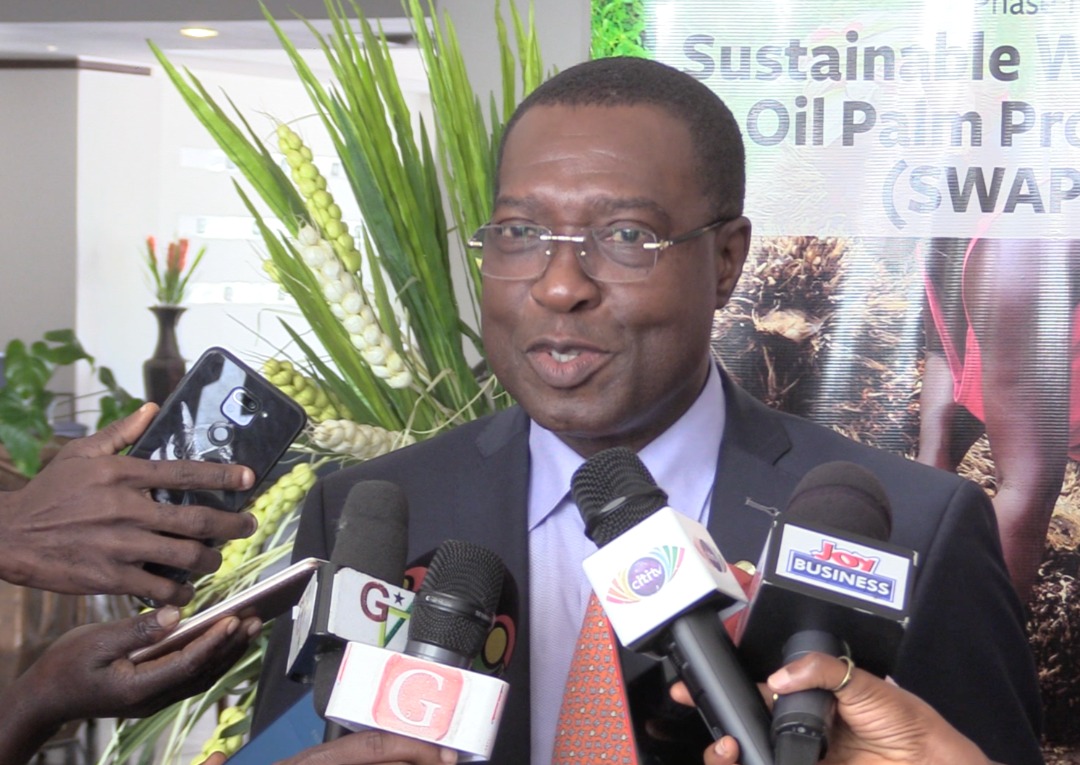
Solidaridad, an international civil society organization has formally ended the second phase of its flagship oil palm programme, the Sustainable West Africa Palm Oil Programme (SWAPP II), with a close-out event today in Accra.
The four-year programme, implemented between 2018 and 2022, sought to transform the West African palm oil sector into an inclusive and sustainable sector through micro, small and medium enterprises that provide large-scale yield intensification and farm rehabilitation services to oil palm farmers and efficient processing of fresh fruits bunches (FFB) in Ghana, Cote d’Ivoire, Liberia, and Sierra Leone.
To achieve this goal, the programme focused on improving access to finance and providing technical support for small and medium enterprises based on two complementary business cases:
● The establishment of rural service centres supplying farmers with the necessary inputs and best management practices (BMP) for the cultivation of oil palm
● Establishment of more efficient and environmentally sound SME milling operations
SWAPP II, which was funded by the Swiss Government through the State Secretariat for Economic Affairs and the Embassy of the Netherlands in Accra, follows the successful implementation of the first phase (2013-2017), which demonstrated the business case for developing a sustainable West African oil palm and processing sector along the lines of small and medium enterprises (SMEs).
Key results and achievements
In a presentation at the close-out ceremony, the Programme Manager, SWAPP II, Nicholas Issaka said a total of 53,602 beneficiaries were reached in the four implementing countries.
He said the programme resulted in increased oil palm farm yield of beneficiary smallholder farmers from an average of 5.2 to 9.1 tonnes per hectare.
He further disclosed that seven improved oil palm mills were constructed, while 13 were also upgraded as part of efforts to increase productivity.
The programme also supported small and medium enterprises to establish 55 Rural Service Centres. These enterprises provided services to 12,263 smallholder farmers.
A total of 4 million euros was mobilized from financial institutions for participating small and medium enterprises and 1.9 million euros mobilized by Village Savings and Loans Associations established under the programme.
In Ghana, Solidaridad strengthened the Oil Palm Development Association of Ghana as the umbrella private sector association for the sector and built its capacity to contribute to the advocacy for the establishment of the Tree Crop Development Authority. It also built the technical capacity of 70 district assemblies executing the oil palm module of the Ministry of Food and Agriculture’s Planting for Export Rural Development (PERD) programme.
Development of a sustainable oil palm sector
Anne Schick, the Acting Head of Cooperation, Embassy of Switzerland in Ghana, indicated that through the programme, significant progress has been made in the development of a sustainable and competitive oil palm sector in Ghana.
“I appreciate the good work that has been done by Solidaridad with the cooperation. Through SWAPP II, the government and people of Switzerland are happy to have supported Ghana’s desire to become self-sufficient in palm oil production and related products,” she said.
Anne Schick noted the Swiss Government would continue to support the palm oil sector under the Ghana Private Sector Competitiveness Programme Phase II (GPSCP II).
In his remarks, Jeroen Verheul, the Dutch Ambassador to Ghana, said the Embassy was excited to have collaborated with the Embassy of Switzerland to co-fund the second phase of the Sustainable West Africa Palm Oil Programme in Ghana.
One of the key achievements of the programme, he said, was the completion and endorsement of the National Interpretation for Roundtable on Sustainable Palm Oil (RSPO) in Ghana, Cote d’Ivoire and Liberia; and the certification of some enterprises and farmers.
Jeroen said the Dutch government was exiting the oil palm sector. He noted the Embassy’s upcoming cooperation strategy for the next five years in Ghana will focus on trade and jobs, and the cocoa and horticulture sectors.”
Strengthening capacity
Under the programme, Solidaridad and the German Agency for International Cooperation (GIZ) under the Ghana Skills Development Initiative, jointly developed the curriculum for a competency-based training in oil palm. The curriculum is accredited by the Commission for Technical and Vocational Education and Training.
Five hundred and six youth received training in four out of the six competency areas in the first quarter of 2021 and 36% of them have been employed in the sector.
For his part, Isaac Gyamfi, Regional Director for Solidaridad West Africa, in his welcome remarks said, “It is worth noting that with the support, collaboration and additional financing from the German government, oil palm is now one of the few agricultural Technical and Vocational Education and Training that has a nationally accredited competency-based training curriculum with accredited schools.
He stated that aside from strengthening the capacity of project beneficiaries, the programme also engaged financial institutions to build their capacity to enable them to support the farmers. As part of the process, 113 financial institutions and impact investors were engaged. Fifty-six financial institutions were trained in oil palm business appraisal.
Under the programme, 384 Village Savings and Loans Associations established by Solidaridad were successfully linked to financial institutions.

